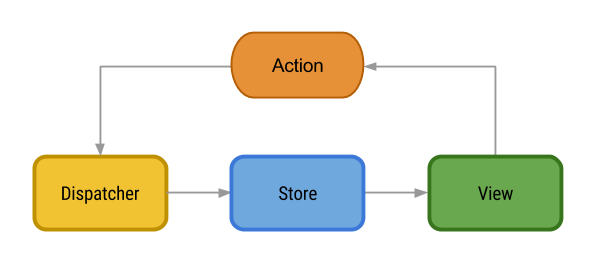Data management wıth Relay and GraphQL
Michał Zdunek
Flux architecture

GraphQL queries
{
user {
firstName,
lastName,
posts {
title,
content
}
}
}{
"user" {
"firstName": "Michal",
"lastName": "Zdunek",
"posts": [
{
"title": "My First Post",
"content": "Hello"
},
{
"title": "My Second Post",
"content": "Bye"
}
]
}
}Field arguments
{
user(id: 2) {
firstName,
lastName,
posts(limit: 1, orderby: DATE) {
title,
content
}
}
}{
"user" {
"firstName": "Jan",
"lastName": "Kowalski",
"posts": [
{
"title": "My First Post",
"content": "Hello"
}
]
}
}Fragments
{
user1: user(id: 1) {
...userInfo
},
user2: user(id: 2) {
...userInfo
}
}
fragment userInfo on User {
firstName,
lastName
}{
"user1": {
"firstName": "Michal",
"lastName": "Zdunek",
},
"user2": {
"firstName": "Jan",
"lastName": "Kowalski",
}
}Mutations
mutation {
createUser(
firstName: "Adam",
lastName: "Nowak",
) {
id
firstName
lastName
}
}{
"createUser": {
"id": 3,
"firstName": "Adam",
"lastName": "Nowak"
}
}Type system
type Query {
user(id: Int): User
}
type User {
id: Int
firstName: String
lastName: String
posts(limit: Int, orderby: PostOrderEnum): [Post]
}
enum PostOrderEnum {
DATE,
TITLE
}
type Post {
title: String
content: String
}Defining queries
const Query = new GraphQLObjectType({
name: 'Schema',
description: 'Root of the schema',
fields: () => ({
user: {
type: UserType,
args: { id: {type: GraphQLInt} },
resolve: (root, args) => UserService.getUser(args.id)
}
})
});
const Schema = new GraphQLSchema({
query: Query
});Defining types
const UserType = new GraphQLObjectType({
name: "User",
description: "This represent a User",
fields: () => ({
_id: {type: new GraphQLNonNull(GraphQLInt)},
firstName: {type: GraphQLString},
lastName: {type: GraphQLString},
posts: {
type: new GraphQLList(PostType),
resolve: (user) => PostService.getPosts(user)
}
})
});Defining mutations
const Mutation = new GraphQLObjectType({
name: "Mutations",
description: "Mutations of our schema",
fields: () => ({
createUser: {
type: UserType,
args: {
firstName: {type: new GraphQLNonNull(GraphQLString)},
lastName: {type: new GraphQLNonNull(GraphQLString)}
},
resolve: (root, args) => UserService.createUser(args)
}
})
});
const Schema = new GraphQLSchema({
query: Query,
mutation: Mutation
});Defining mutations
const Mutation = new GraphQLObjectType({
name: "Mutations",
description: "Mutations of our schema",
fields: () => ({
createUser: {
type: UserType,
args: {
firstName: {type: new GraphQLNonNull(GraphQLString)},
lastName: {type: new GraphQLNonNull(GraphQLString)}
},
resolve: (root, args) => UserService.createUser(args)
}
})
});
const Schema = new GraphQLSchema({
query: Query,
mutation: Mutation
});Why use GraphQL?
- Less coupling between the server and the client
- With REST, adding a new feature requires a new endpoint
- With GraphQL, the client simply declares its needs
- The worst case - we enhance the type declarations on the server
Relay containers
class User extends React.Component {
render() {
var {firstName, lastName} = this.props.user;
return (
<div>{firstName} {lastName}</div>
);
}
}
User = Relay.createContainer(User , {
fragments: {
user: () => Relay.QL`
fragment on User {
firstName,
lastName,
}
`,
},
});Relay - composition
class UsersList extends React.Component {
render() {
return <div>
{this.props.store.users.map(
user => <User user={user} />
)}
</div>;
}
}
UsersList = Relay.createContainer(UsersList, {
fragments: {
store: () => Relay.QL`
fragment on Store {
users { ${User.getFragment('user')} },
}
`,
},
});Relay root container
var usersRoute = {
queries: {
store: (Component) => Relay.QL`
query StoreQuery {
store { ${Component.getFragment('store')} },
}
`,
},
name: 'UsersRoute',
};
ReactDOM.render(
<Relay.RootContainer
Component={UsersList}
route={usersRoute}
/>,
document.getElementById('app')
);That's all
- facebook.github.io/relay
- graphql.org